At a time when people are divided and angry with one another because of political and societal beliefs, it is gratifying to learn that history is filled with people who seem to be polar opposites and yet, nevertheless, were friends.
From Mark Twain and Nikola Tesla to Hunter S. Thompson and Pat Buchanan, I will reveal five unlikely bonds between notable figures that I will wager you never knew were friends.
But first, a little background on the topic of friendship and the wedge being driven between Americans by political operatives and our weaponized government.
I have conservative friends who tell me they have been “unfriended” by their liberal acquaintances because they are Donald Trump supporters.
I find it interesting that conservatives don’t seem to be jettisoning their liberal friends at the same rate.
Perhaps it is because most conservatives are more tolerant and nonjudgmental than those on the left who view their beliefs as ‘The Truth,” rather than merely opinion.
It’s as if they are saying, “If you don’t believe what I believe and think the way I think, then you must be immoral or evil.”
Think about how the left views issues such as climate, race, crime, transgenderism, DEI (diversity, equity and inclusion), and Critical Race Theory, etc. If you don’t align with their attitudes on these issues, then you must be a flawed bottom feeder in the hierarchy of ideas.
How else can you explain supposedly rational people like Hillary Clinton calling for Trump supporters to undergo “formal deprogramming” in reeducation camps?
Or Democrats in Congress suggesting that the government remove children from Make America Great Again Republicans so conservative MAGA ideas won’t taint them.
While that kind of weaponization of government may appear far-fetched, it seems within the realm of possibility, given what recently transpired.
For example, the House Judiciary Committee revealed that federal investigators asked banks to search and filter customer transactions by using terms like “MAGA” and “Trump” as part of an investigation into Jan. 6. Investigators warned that purchases of “religious texts” could indicate “extremism.”
“In other words, (the Federal Government) used large financial institutions to comb through the private transactions of their customers for “suspicious” charges on the basis of protected political and religious expression,” Judiciary Committee Chairman Jim Jordan, said.
Is it any wonder that friendships are being severed when our president calls almost 75 million Americans who voted for Donald Trump in 2020, “extremists and insurrectionists?”
When even our government is complicit in creating division and discord between Americans, maintaining friendships with those with different political views is becoming more and more difficult.
Yet, history shows that there are cases where opposites not only attracted, but actually developed into lifelong friendships.
Take a look. My thanks to History Facts for their research on this issue.
Historical Figures You Didn’t Realize Were Friends
Muhammad Ali once said, “Friendship is the hardest thing in the world to explain. It’s not something you learn in school. But if you haven’t learned the meaning of friendship, you really haven’t learned anything.” Like Ali and his own best pal, photographer Howard Bingham, some friendships in history have been formed by figures with wildly different backgrounds and career choices.
The following friendships are as surprising as they were genuine here are five unlikely bonds between notable figures you never knew were friends.
Mark Twain and Nikola Tesla
A friendship between the famed writer Mark Twain and inventor Nikola Tesla might, on the surface, seem unlikely. And yet, before the two met, they already shared some significant interests. Tesla had once been bedridden for nine months with a severe bout of cholera, during which time he read some of Twain’s earlier works. He later described them as “unlike anything I had ever read before and so captivating as to make me utterly forget my hopeless state.”
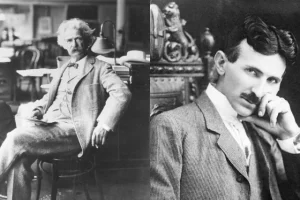
Twain, meanwhile, was fascinated by technological innovations and, in particular, electricity. When the two men eventually met in the 1890s, they became friends and spent a lot of time together in Tesla’s lab and elsewhere. One famous account tells of Twain’s participation in an experiment involving an electromechanical oscillator, which Tesla believed might be therapeutic. But when Twain sat on the vibrating plate, it served as something of a laxative, forcing the acclaimed author to run for the bathroom.
Arthur Conan Doyle and Harry Houdini
The story of Arthur Conan Doyle and Harry Houdini is one of both friendship and rivalry. The celebrated mystery author (and creator of Sherlock Holmes) and the famous illusionist first met in 1920, during the magician’s tour of England. Their shared interest in spiritualism — and the use of séances to contact the dead — initially brought them together.
But the two men took fundamentally different paths thereafter. Conan Doyle (in stark contrast to his highly rational and analytical Holmes) became increasingly obsessed with and convinced by the existence of spiritual powers. Houdini, on the other hand, began exposing fraudulent mediums and decried spiritualism as “nothing more or less than mental intoxication.”
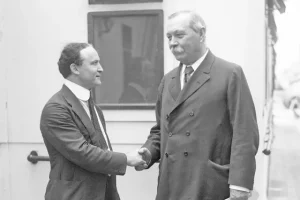
After Conan Doyle’s wife, Jean, supposedly contacted Houdini’s mother during a séance in 1922, Houdini publicly announced that he did not believe the message came from beyond the grave. This is partly because the message consisted of 15 pages of handwritten, English-language notes, and his mother didn’t speak English.
Not long after the séance, the friendship began to break apart.
Ella Fitzgerald and Marilyn Monroe
Ella Fitzgerald and Marilyn Monroe struck up a friendship in the 1950s. Hollywood’s favorite blond bombshell was a huge fan of Fitzgerald’s music, and went to see her perform in Los Angeles in 1954. The two met in person, and soon formed a tight bond. Monroe famously helped Fitzgerald land a gig at L.A.’s renowned Mocambo nightclub, which had previously rejected Fitzgerald due to what they saw as her lack of sex appeal (not because of her race, as the story often goes).
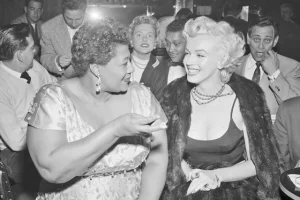
Monroe ensured that numerous A-list celebrities attended each performance, drawing plenty of media attention. The gigs were a turning point in the career of the “First Lady of Song.” When asked about their relationship, Monroe said, “Well, my very favorite person, and I love her as a person as well as a singer, I think she’s the greatest, and that’s Ella Fitzgerald.”
The two women remained friends until Monroe’s death at the age of 36.
John F. Kennedy and Frank Sinatra
It’s not known precisely when John F. Kennedy and Frank Sinatra first met, but by the end of the 1950s they were well acquainted. The politician and crooner notoriously shared a love of nightlife and women, so it’s perhaps no surprise they got along. But beyond their mutual admiration, their relationship was beneficial to both men.
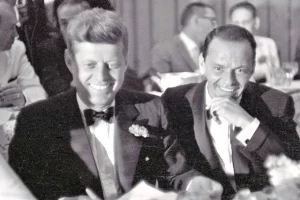
Sinatra gained access to the corridors of power, while Kennedy counted on Sinatra’s star power to win him votes in the 1960 presidential election. When Kennedy won, the President-elect publicly thanked Sinatra for his efforts in the campaign. But the friendship waned after JFK entered the White House, partly because First Lady Jackie Kennedy reportedly disliked the singer, and also due to Sinatra’s alleged connections with organized crime.
Hunter S. Thompson and Pat Buchanan
The “gonzo” journalist Hunter S. Thompson made no secret of his intense hatred of Richard Nixon, who he said represented “that dark, venal, and incurably violent side of the American character.” It’s something of a surprise, then, that Thompson ended up being good friends with the conservative politician Pat Buchanan — who was once one of the most trusted advisers to none other than President Nixon.
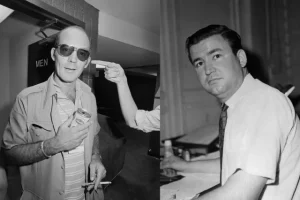
Thompson, most famous for his counterculture magnum opus Fear and Loathing in Las Vegas (1972), met Buchanan during Nixon’s presidential 1972 campaign. He later said of their friendship, “We’re still friends. Patrick is a libertarian, or at least in that direction. I think of politics as a circle, not a spectrum of one line, not just right and left. Patrick and I are often pretty close. Patrick’s an honest person.”
The two remained friends until Thompson’s death in 2005.
So, there you have it. Unlikely friendships. And, like a lot of friendships, they weren’t always lifelong.
But at least they weren’t wrecked by the American president and his bureaucratic toadies.
–30—
My thanks once again to History Facts for allowing me to share this information.
If you enjoyed this post, please consider subscribing to ForeignCorrespondent and tell your friends to subscribe. IT’S FREE! WHAT A DEAL! If you’ve received this from a friend and would like to be added to our distribution list for future blog posts, please enter your email address in the sign-up for notifications box at https://ronaldyatesbooks.com/category/foreign-correspondent.
You can also find my commentaries on Substack at https://ronyates.substack.com/ and the American Free News Network at https://afnn.us.
Please feel free to comment. WE LOVE COMMENTS!

